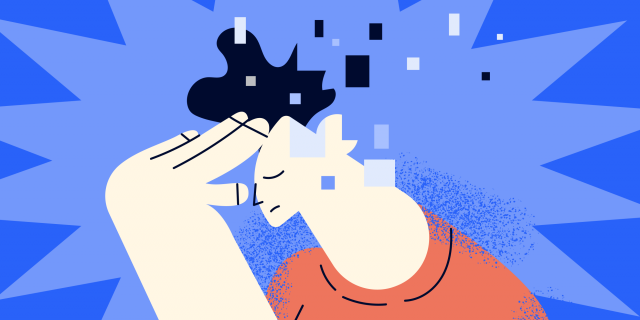When headache and nausea require immediate medical attention
Sometimes the condition that caused the headache and nausea can be life-threatening. Call for immediate medical attention if:
occurs after an injury;
is accompanied by fever, stiff neck muscles, skin rash;
is very severe, comes on suddenly and feels like a thunderclap;
accompanied by seizures, double vision, numbness or weakness in the limbs, speech disorders.
Natalia Oryshich, a neurologist and parkinsonologist, adds a few more “red flags” to this list: intense unaccustomed pain and fountain vomiting, pain immediately after waking up, gait and vision disorders.
All these symptoms may indicate a tumour, meningitis or brain injury, which require urgent medical intervention.
What are the common causes of headache and nausea
Headache and nausea can have different causes but occur with some pathological condition. For example, nausea and vomiting can be caused by poisoning and lead to dehydration, of which the headache will be a symptom. Such coincidences can be very many, to list them all is unrealistic.
But there are conditions in which both headache and nausea will be signs of one process. Here they are.
Migraine
This is a throbbing headache accompanied by nausea, vomiting and photosensitivity.
Some people experience migraine precursors, or aura – a set of signs that suggest another episode is about to happen. These include visual disturbances, flashes of light, difficulty speaking, and tingling in the extremities.
It took scientists a long time to figure out the causes of migraine. Now it is believed that some people have neurons in the brain stem and trigeminal nerve system are very sensitive. And therefore react inappropriately to certain stimuli:
hormonal fluctuations in women;
alcohol;
caffeine;
stress;
visual stimuli or strong odours;
lack of sleep or excessive sleep;
weather changes;
physical exertion;
certain foods – aged cheeses, salty and spicy foods, foods with sweeteners or flavour enhancers;
certain medications – oral contraceptives, vasodilators such as nitroglycerin.
The provocateurs can vary from person to person. So you need to keep track of exactly what triggers a reaction in you to avoid them.
What to do
With the signs of a migraine, you should definitely see a neurologist. Especially since it is now treatable. The protein that causes the attack is known – CGRP. With the help of drugs that contain antibodies against it, it can be blocked and achieve complete disappearance of headache attacks and related symptoms.
If before it was possible to fight only the symptoms, now scientists know which parts of the brain are involved in the development of an attack, which structures interact with each other and with the help of which proteins.
This has made it possible to use targeted therapy – aimed at specific targets. Migraine is therefore being treated much more successfully than it used to be.
If you need to relieve an exacerbation right now, use painkillers such as paracetamol or ibuprofen. But still see a neurologist afterwards.
Stress
Stress, insomnia, prolonged strain on the eyes and chewing muscles often cause tension headaches. That said, stress and anxiety also cause nausea in some people, especially those with gastrointestinal problems, depression and anxiety.

